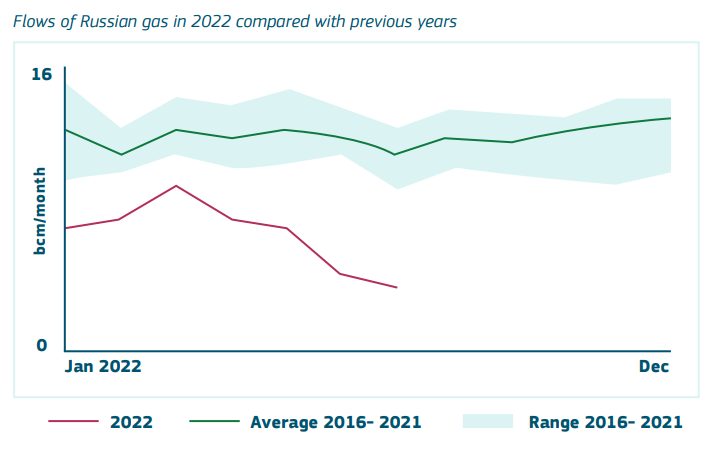EU calls on member states to cut gas usage 15 per cent amid fears Russia will turn off the taps

The European Union (EU) has urged member states to cut gas usage by 15 per cent until next March, as an emergency step heading into winter, when demand will be at its peak in the coldest months of the year.
The bloc’s executive arm, the European Commission, has proposed a voluntary target for all EU states to reduce gas use from August to March, compared with their average consumption in the same period between 2016-2021.
The target would become mandatory in a supply emergency, such as if the bloc declared a substantial risk of severe gas shortages.
The move, which needs the backing of all EU states, will be discussed this Friday so ministers can potentially approve it on July 26.
Currently, the bloc is scrambling to ensure storage facilities are 80 per cent full by November, with levels currently sitting at around 65 per cent.
While the bloc has imposed sanctions on coal imports and seaborne shipments from Russia following its invasion of Ukraine, it has not brought in sanctions against its coal supplies – with the EU dependent on Russia for around 40 per cent of its imports.
The numbers are even higher in some European countries, including Germany – the bloc’s largest economy – which depends on Russia for around 50 per cent of its imports.
So far, only Lithuania has brought in measures to curtial Russian gas, with the EU spending over €30bn on Russian gas since the country’s invasoon of Ukraine.
Putin puts pressure on Europe with Nord Stream remarks
The call for reduced consumption follows Russian President Vladimir Putin warning that Kremlin-backed supplies sent via Nord Stream 1 could be stopped unless key equipment was returned from Canada.
Controversy has focused on a Siemens turbine, which is being sent to Germany from Canada, but the Russian premier suggested the quality of the returned gear and other parameters meant the pipeline might still lead to a complete shut down in the future.
In televised comments, he said: “Maybe… they will turn it off at some point, and that’s it, and Nord Stream 1 will stop, because they came from there, from Canada.”
In earlier remarks, Putin explained that one of the five gas pumping units, operated by Siemens Energy at Nord Stream 1, was out of order due to a “crumbling of inside lining” and another was due to for further maintenance on July 26.
Nord Stream 1 is the key gas pipeline from Russia into Europe, travelling under the Baltic Sea to Germany, which relies heavily on Russian fuel.
European politicians argue that Russia is using equipment issues as a pretext to cut deliveries, while the Kremlin maintains that Russia is a reliable energy supplier and blames sanctions for reduced flows.
Nord Stream 1 deliveries typically account for more than a third of Russian gas exports to the EU.
However, sources told news agency Reuters that flows via Nord Stream 1 was expected to restart tomorrow, but below capacity of 160m cubic metres per day.
Currently, the pipeline is undergoing ten days of scheduled maintenance.

In the weeks running up to its temporary closure, Germany reported shortages of up to 60 per cent from the pipeline, triggering the second stage of a three step emergency gas plan in the country – which could eventually lead to the country confiscating and rationing supplies.
This shortfall has helped power gas prices to historically elevated levels.
The front-month gas contract climbed above €160 per megawatt hour (MWh) today – which is 360 per cent up on a year ago, although below its March peak of €335.
Meanwhile, flows via other routes, such as Ukraine, have also fallen since the invasion, despite Kremlin pledges to serve world markets.
The price surge has squeezed utility companies which rely on Gazprom’s gas, with the German government now considering government plans to inject billions of euros into the country’s biggest buyer of Russian energy, Uniper.
So far, Russia has either suspended or totally cut off gas flows to 12 EU member states, with many of them refusing to acquiesce to Russian demands for rouble payments for energy supplies.
EU Commission President Ursula von der Leyen has accused Russia of blackmail, and has called on Europe to prepare for the winter ahead.
She said: “Russia is blackmailing us. Russia is using energy as a weapon. And therefore, in any event, whether it’s a partial, major cut-off of Russian gas or a total cut-off of Russian gas, Europe needs to be ready,”
Gas market stretched as EU scrambles for supplies
Earlier this month, Gazprom sent letters to large utility providers warning it could no longer guarantee fulfilling its gas contracts due to the “extraordinary circumstances.”
The International Energy Agency has suggested Europe should boost coal usage this winters, should bring in auctions to encourage gas users to cut demand, and top up its supplies to 90 per cent of capacity.
It warned there is insufficient supplies outside of Russia to make up the shortfall, even as the EU scrambles to secure deals with the US, Middle East and Norway in case of shortages.

Last winter, Europe staved off potential blackouts courtesy of consistent arrivals of liquefied natural gas (LNG) from the US.
The EU has since been chasing alternative supplies, although the global gas market was stretched even before the Ukraine crisis amid rebounding demand for fuel following the pandemic-induced downturn.
While Europe is Russia’s biggest customer for energy supplies, Gazprom has announced the gas supplies heading to China from Russia hit a new daily record.
The Kremlin has been expanding capacity to supply China even as deliveries to Europe dwindle, although Russia’s far east network is not connected to the European supply system.